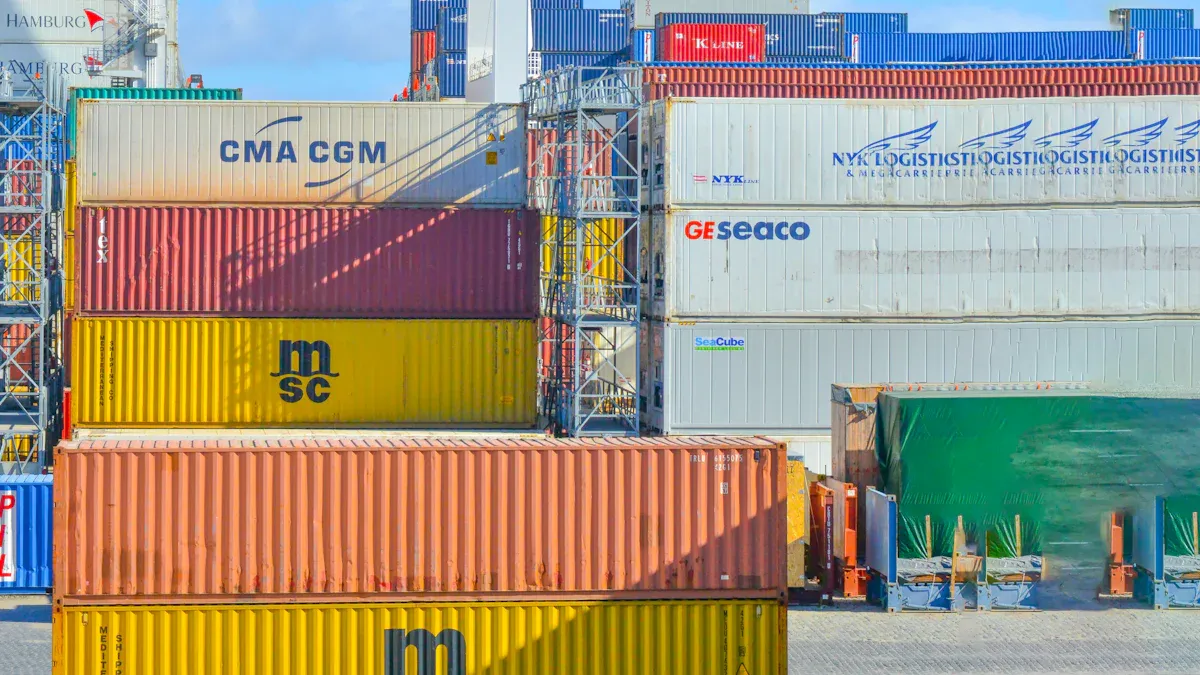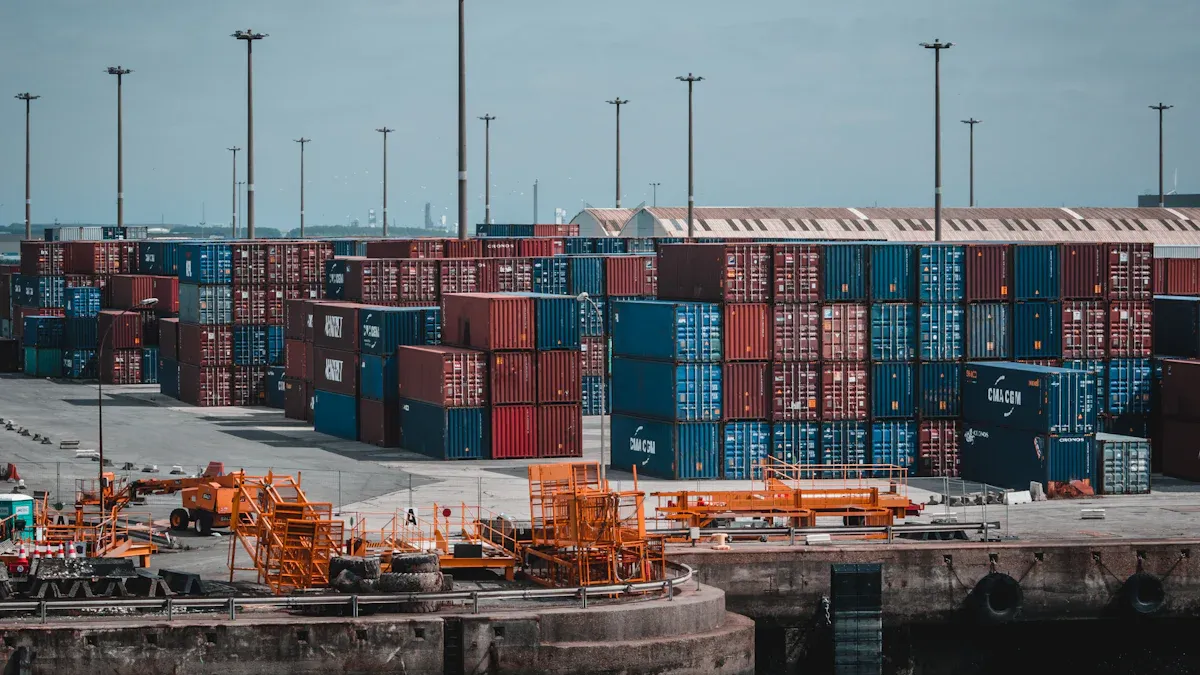How Logistics Brokers Optimize Supply Chain Management in 2025

You see logistics brokers supply chain management becoming more important as logistics operations grow more complex in 2025. New technology, automation, and the rise of e-commerce have changed how you move goods. Today, you must keep up with real-time data and fast-changing consumer demands.
Companies now face:
Global labor shortages
The need for instant visibility
Benefit | Description |
|---|---|
Brokers use technology and staff to save you valuable hours. | |
Cost Savings | Their carrier network and expertise help you lower shipping expenses. |
Expert Service | You get reliable support, even during busy or unpredictable periods. |
You gain efficiency, save money, and streamline your operations by working with experts in this field.
Key Takeaways
Logistics brokers save you time and money by connecting you with the right carriers and negotiating better shipping rates.
Using technology like real-time tracking and data analytics helps you make informed decisions and improve your supply chain efficiency.
Building strong relationships with brokers leads to better service and more reliable deliveries, especially during busy seasons.
Flexibility is key; brokers help you adapt to changing shipping needs and manage risks effectively.
Choose a broker who aligns with your business goals and offers strong technology support for seamless operations.
Logistics Brokers Supply Chain Management: Core Functions

Connecting Shippers and Carriers
You play a key role in moving goods when you use logistics brokers supply chain management. Brokers act as the bridge between shippers who need to move products and carriers who have the trucks and drivers. This connection helps you find the right partner quickly and keeps your shipments on track.
Tip: Building strong relationships with both shippers and carriers leads to better service and more reliable deliveries.
Here is how brokers connect shippers and carriers based on recent industry practices:
Strategy | Example Result |
|---|---|
Leverage Online Freight Marketplaces | A broker used DAT load boards for agricultural shipments, increasing annual revenue by 40%. |
Build Relationships through Networking | Brokers at industry events saw a 25% rise in direct business connections in six months. |
Utilize Load Boards and Directories | Brokers using load boards secured 60% more contracts than those using only cold outreach. |
Cold Calling and Email Marketing | Personalized emails achieved a 29% higher response rate than standard outreach. |
Partnering with Carriers | Strategic alliances led to long-term contracts with national grocery chains. |
You benefit from these strategies because brokers have access to a wide network. They use technology and personal connections to match your shipments with the best carriers. This saves you time and helps you avoid delays.
Carrier Selection and Rate Negotiation
Choosing the right carrier and getting a good shipping rate can be hard. Logistics brokers supply chain management gives you an advantage. Brokers know which carriers are reliable and which ones offer the best prices. They use their experience and data to help you make smart choices.
You can measure how well brokers select carriers and negotiate rates by looking at these metrics:
On-time delivery rates show if your shipments arrive as promised.
Load acceptance rate tells you how often carriers agree to take your loads.
Load-to-truck ratio helps you understand the balance between available loads and trucks, which affects pricing.
Quote conversion ratio shows how many quotes turn into actual shipments.
Gross profit margin percentage lets you see how much profit comes from brokering activities.
Brokers use these numbers to improve their service. You get better rates and more reliable deliveries because brokers know how to negotiate and choose the right partners.
Streamlining Shipping Operations
You want your shipping process to be smooth and efficient. Logistics brokers supply chain management helps you reach this goal. Brokers use advanced analytics and technology to plan the best delivery routes. This reduces fuel use and speeds up deliveries.
Brokers centralize and streamline logistics tasks.
They help you find and connect with new carriers.
They track loads and keep you updated.
They communicate with shippers and carriers to solve problems fast.
TMS (Transportation Management System) software helps brokers manage many tasks at once. You get real-time updates, faster order processing, and fewer mistakes. This technology also improves visibility, so you always know where your shipments are.
Note: When you work with a broker, you can focus on growing your business while they handle the details of shipping.
Logistics brokers supply chain management gives you the tools and support you need to move goods efficiently, save money, and keep your customers happy.
Technology Integration and Real-Time Tracking

Digital Platforms for Visibility
You need to see where your shipments are at all times. Digital platforms give you this power. Logistics brokers use online dashboards and mobile apps to show you real-time updates. You can check shipment status, delivery times, and even driver locations. These tools help you spot problems early and keep your customers informed. When you use digital platforms, you make faster decisions and avoid delays.
Tip: Choose brokers who offer easy-to-use tracking systems. This helps you stay in control and respond quickly to changes.
Data Analytics in Logistics
You can improve your supply chain by using data analytics. Logistics brokers supply chain management relies on analytics to turn raw data into useful information. This helps you make smart choices and boost performance.
Evidence | Description |
|---|---|
Decision-Making | Analytics tools provide insights that help you choose the best shipping options. |
Operational Efficiency | You find weak spots in delivery routes and spot underperforming carriers. |
Demand Forecasting | Predictive analytics lets you plan for busy times and manage inventory better. |
Visibility | You see risks before they become big problems. |
You track supplier performance, delivery times, and order accuracy. Data analytics also helps you work better with suppliers. You reduce lead times and give your customers a better experience.
System Integration for Efficiency
You want your systems to work together smoothly. Brokers connect transportation, accounting, and inventory software to create one unified system. This integration makes your operations faster and more accurate.
Benefit Description | Evidence |
|---|---|
Real-time operational efficiency | Integrations help you make quick decisions and avoid surprises. |
Automated workflows | You handle more shipments without hiring extra staff. |
Enhanced visibility with unified data | You and your carriers see all the details in one place. |
Faster payments and cleaner bills | Integrated accounting speeds up billing and payments. |
Adaptability to business growth | You manage more shipments as your business grows, without losing quality. |
When you use integrated systems, you save time and money. You get better visibility and can scale your business easily.
Key Benefits for Businesses
Cost Reduction and Efficiency
You want to save money and work smarter. Logistics brokers supply chain management helps you do both. Brokers negotiate better rates for you. They check carriers for reliability and compliance. They also handle paperwork, scheduling, and problem-solving.
You spend less time on broker operations when you let experts manage these tasks.
Many businesses report spending up to 480 hours a year on broker operations.
Most agree they could be more successful if they spent less time on these tasks.
Brokers use technology to modernize payments and operations. Over half of businesses still use paper checks, but new tools can speed up billing and reduce errors. When you use brokers, you gain more time to focus on your core business.
Flexibility and Scalability
Your shipping needs can change fast. Brokers help you stay flexible and scale up or down as needed.
They give you access to a wide network of carriers, so you can handle busy seasons or sudden changes.
You get uninterrupted service, even when demand spikes.
Freight marketplaces let you choose from more carrier options and negotiate better rates.
During peak holiday seasons, brokers find extra trucks when standard providers cannot. This keeps your business moving, no matter the challenge.
Risk Management and Problem Resolution
You face risks like delays, theft, or compliance issues. Brokers help you manage these risks.
They use tracking tools to spot problems early and fix them fast.
Data analytics helps you plan for price changes and lock in good rates.
Brokers create backup plans for weather or other disruptions.
They also keep up with rules and automate compliance checks. You avoid fines and delays. Brokers advise on safe routes and protect your data with strong cybersecurity.
Enhanced Customer Service
You want your customers to stay happy. Brokers help you deliver on time and solve problems quickly.
They match your shipments with the best carriers to avoid delays or damage.
You get real-time updates and clear communication.
Brokers use data to resolve disputes and verify claims.
With tools like Transportation Management Systems, you streamline your operations and make better decisions. Real-time tracking and predictive analytics give you a competitive edge. Your customers notice the difference and trust your service.
Working with Logistics Brokers
Choosing the Right Broker
You want a logistics broker who fits your business needs. Start by researching their services and specialization. Look at their experience and reputation. Make sure they use strong technology and tracking tools. Check their cost and pricing structure. Customer service and support should meet your standards. Safety and compliance must be a priority. Choose a broker who offers flexibility and scalability for future growth.
Criteria | Description |
|---|---|
Multimodal capabilities | Brokers should handle different types of freight and adapt to your changing needs. |
Technology and tracking | Real-time tracking and data tools help you monitor shipments and deliveries. |
Safety and compliance | Brokers must follow safety rules and keep up with regulations. |
Financial stability | Pick a broker with strong finances to reduce risks in your supply chain. |
A good brokerage firm should have a robust technology infrastructure that allows for real-time tracking of shipments, as well as communication with carriers and shippers.
Best Practices for Collaboration
You get the best results when you work closely with your broker. Clear and open communication is essential. Set written goals and expectations for your partnership. Stay honest and transparent to build trust. Address problems quickly and work together to solve them. Use technology to share updates and track shipments. Build a strong carrier network for reliable service and competitive pricing.
Communicate openly and honestly.
Set clear goals and expectations.
Respond quickly to unexpected events.
Use digital tools for tracking and updates.
Grow your carrier network for better options.
Honesty and transparency are vital when it comes to establishing fruitful partnerships. Promote a mutual feeling of open communication, both personal and professional.
Case Studies
You can learn from successful partnerships between businesses and logistics brokers. These examples show how the right broker can improve your supply chain.
Business Partner | Logistics Broker | Benefits |
|---|---|---|
Pfizer | McKesson | Faster market delivery and consistent supply |
Merck & Co. | Cardinal Health | Streamlined operations and reduced costs |
DHL Express | Lufthansa Cargo | Enhanced time-sensitive delivery capabilities |
These companies improved delivery speed, reduced costs, and gained reliable supply by working with expert brokers. You can achieve similar results by choosing the right partner and following best practices.
Challenges and Future Trends
Overcoming Common Obstacles
You face many challenges in logistics brokerage. Market volatility can change freight rates quickly. Finding reliable carriers is important for smooth deliveries. Tight margins make it hard to grow your business. Technology integration helps you stay competitive, but it can be tough to adapt. Building trust with shippers takes time and clear communication. Last-minute changes often strain your resources. Preventing fraud protects your business and customers. Balancing supply and demand is tricky, especially during busy seasons. You need to stand out in a crowded market to maintain your competitive advantage. Retaining customer accounts requires strong relationships and regular updates.
Common challenges you may encounter:
Market volatility
Finding reliable carriers
Managing tight margins
Technology integration
Building trust with shippers
Dealing with last-minute changes
Preventing fraud
Balancing supply and demand
Maintaining competitive advantage
Retaining customer accounts
AI and Automation
You can use AI and automation to solve many supply chain problems. AI agents help you automate complex tasks and make better decisions. They optimize inventory management and improve route planning. You can forecast demand more accurately and adjust delivery routes to avoid traffic jams. In warehouses, AI agents organize item picking to prevent bottlenecks.
Logistics brokers are leveraging AI and automation to enhance efficiency, adaptability, and decision-making in supply chain management. AI agents are being utilized to automate complex tasks, optimize inventory management, improve route planning, and enhance demand forecasting, thereby addressing various supply chain challenges.
Unlike traditional automation, AI agents react to real-time data. You can adjust your operations quickly when unexpected events happen. This flexibility helps you stay ahead of disruptions and keep your supply chain running smoothly.
Sustainability and Global Expansion
You need to think about sustainability as your business grows. Most companies now see sustainability as vital for future success. Many firms maintain or increase their sustainability efforts, even when facing global uncertainties. European regulations push companies to report their sustainability actions clearly, which affects global operations.
Evidence | Description |
|---|---|
Indicate that sustainability is vital for their future success. | |
85% of companies | Report maintaining or increasing sustainability efforts. |
European regulations | Push for standardized and transparent reporting worldwide. |
You can expect more focus on sustainability and ESG goals in the future. Predictive analytics will help you manage risks and disruptions. AI-driven demand forecasting will use real-time data to improve your planning. These trends will shape how you compete and grow in global markets.
You see logistics brokers as key partners for supply chain success in 2025. They help you cut costs, boost efficiency, and stay compliant. You gain access to more carriers, flexible shipping options, and real-time tracking. To stay competitive, you should choose brokers who match your goals and use smart technology. As trends shift, adapt by using data, building strong partnerships, and planning for disruptions.
Tip: Focus on brokers who offer scalable solutions and keep you informed about new industry changes.
FAQ
What does a logistics broker do for your supply chain?
You get help finding carriers, negotiating rates, and tracking shipments. Brokers use technology to give you real-time updates. They solve problems and keep your goods moving.
How can you choose the best logistics broker?
Look for brokers with strong technology, good reviews, and experience in your industry. Ask about their carrier network and customer support. Make sure they follow safety rules.
Why should you use real-time tracking?
You see where your shipments are at any moment. Real-time tracking helps you spot delays early. You keep your customers informed and make better decisions.
Can logistics brokers help you save money?
Yes, brokers negotiate better rates.
They find reliable carriers.
You avoid costly mistakes and delays.
What technology do brokers use in 2025?
Technology | Benefit |
|---|---|
TMS Software | Faster order processing |
Mobile Apps | Easy shipment tracking |
AI Agents | Smarter route planning |
See Also
Enhancing Global Operations With Innovative Logistics Solutions
Simplifying Supply Chain Optimization With U.S. Logistics Solutions
Boosting Global Efficiency Through Point-to-Point Logistics Systems
